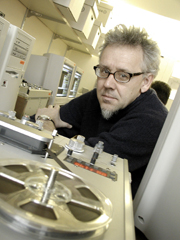
 |

|
|
 |
|
|
|||
 Greg Nielsen, at Concordia’s Centre for Broadcasting Studies. Photo by Christian Fleury |
by Frank Kuin Sixteen years’ worth of world events are steadily beeping and crackling their way into broadcast history at Concordia’s Centre for Broadcasting Studies. In a small, deserted room at the Centre, voices from the past can be heard discussing anything from Scottish self-government to Chinese nuclear capabilities, as four reel-to-reel tapes quietly roll next to high-tech digital audio equipment. Turn one of the machines up, and you might hear a crackling radio news item on the conflict in Lebanon, or the Watergate scandal, or the Falklands War. Every so often, one of the machines sounds the beeps that indicate the top of the hour. In all, the tapes contain about 9,000 hours worth of newscasts from the BBC World Service, systematically recorded from short-wave radio by the late Denis Diniacopoulos between 1970 and 1986, while he was a professor in Concordia’s Communications Studies Department. Now, the Concordia Centre for Broadcasting Studies (CCBS), which was bequeathed the recordings after Diniacopoulos’ death in 1997, is transferring them onto CD-ROM to turn them into a unique archive. Not even the BBC has kept the newscasts. Of the 9,000 hours of tape, about 2,500 have so far been dubbed, at a rate of two tapes of four hours per machine per day, or 32 hours per day. The transfer should be completed by November. “It’s an exciting prospect,” said Greg Nielsen, director of the Centre for Broadcasting Studies, who is leading the Diniacopoulos BBC World News Project. “We’re developing a tool for researchers on a global scale.” Comprehensive holdings Members of the CCBS have traveled to London to discuss their bequest with the British Broadcasting Corporation. “The BBC has been very interested in encouraging us to undertake the project, because it has no comprehensive record of its own broadcasts in those years,” Nielsen said. In addition to consultations on the technicalities of how best to digitalize the fragile reel-to-reel tapes, the CCBS has negotiated a copyright agreement with the BBC, giving Concordia the right to make the recordings available for research purposes only. Also, the Centre has received a copy of an index the BBC has kept of news reports that were filed from all over the world during these years. This will serve as a guide to Concordia’s holdings (which include only reports that actually made it to air). Over the next year, the CCBS will develop a Web site with an overview of its holdings and samples from various periods, Nielsen said. It will also contain an invitation for researchers to access the archive. “Say you want all the news programs about [former Egyptian President Anwar] Sadat that were there, perhaps 50 or 60 reports over this 16-year period,” he explained. “We could go into these archives and prepare a CD with copies of those newscasts.” A release form would have to be signed stating that the copies would be used for research purposes only, he added. The Diniacopoulos BBC World News Project entails more than the making of the digital archives. Scholarships and fellowships will be offered for undergraduate and graduate students who submit proposals for research on the recordings. In addition, a lecture series, the Diniacopoulos BBC Speaker Series, is being organized on the role of media in modern society. It will be kicked off on Tuesday, March 5, by Professor Stuart Ewen, chair of the Department of Film and Media Studies at Hunter College in New York. The entire project was initiated through a contribution to the captial campaign from the late Olga Nicolas-Diniacopoulos, Professor Diniacopoulos’ mother. This was part of a much larger gift that also established the endowed Vincent, Denis and Olga Nicolas-Diniacopoulos Undergraduate Scholarships to promote interdisciplinary studies. Ewen, known for his critique of the commercialization of modern media, will speak on “The Eclipse of Public Culture: Media Consumption, PR and the City.” This theme fits well within the work the CCBS wants to develop, Nielsen said. This work, which also includes the current Culture of Cities project, seeks to formulate critiques of public culture after modernity. Newscasts by the BBC World Service serve as “a counterexample” within this critique, Nielsen said. The BBC has built a reputation of “giving always the same level of rigor, the same reputation of objectivity, and never being there to sell soap.” Back in the dubbing room, technical supervisor Roger des Ormeaux monitored progress. Reel-to-reel tape machines have fallen out of favour, he said, so the Centre is using old machines that have been outfitted with new motors and new heads. “Short-wave radio broadcast quality is quite unpredictable,” he said. Sound-compressing software is used to ensure that volumes are stabilized. While the tapes disintegrate, the high-quality CDs are “guaranteed to last for at least another 100 years.” |